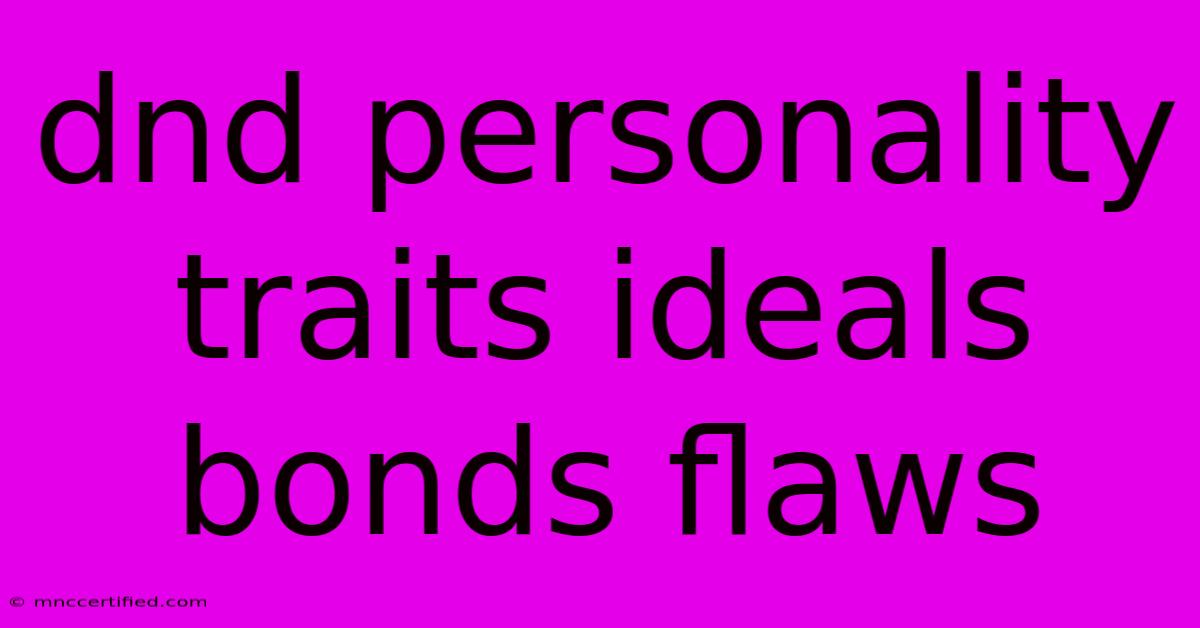Dnd Personality Traits Ideals Bonds Flaws

Table of Contents
Crafting Compelling Characters: D&D Personality Traits, Ideals, Bonds, and Flaws
In the fantastical world of Dungeons & Dragons, your character is more than just a collection of stats and abilities. They're living, breathing individuals with personalities, motivations, and flaws that shape their actions and interactions.
D&D provides a framework for fleshing out your character's inner world through Personality Traits, Ideals, Bonds, and Flaws. These elements add depth and complexity, making your character feel real and relatable, even in a world of magic and monsters.
The Building Blocks of Character:
1. Personality Traits:
These are brief descriptions that encapsulate your character's typical demeanor and behavior. Consider things like:
- Their attitude: Are they jovial and optimistic, stoic and reserved, or cynical and sarcastic?
- Their habits: Do they fidget nervously, speak in riddles, or have a penchant for dramatic pronouncements?
- Their quirks: Do they have a strange phobia, an unusual fascination, or a tendency to overshare?
Examples:
- "I'm always the life of the party, even if it means telling a questionable joke."
- "I prefer to observe and analyze before jumping into action."
- "I have a knack for finding trouble wherever I go."
2. Ideals:
These are the core beliefs that guide your character's actions and decisions. They represent what they value most in life and what they strive to achieve. Consider:
- What is most important to them? Justice, knowledge, power, freedom, family?
- What do they believe in? The importance of order, the sanctity of life, the pursuit of progress, the strength of faith?
- How do they put their ideals into practice? Do they champion the downtrodden, strive for self-improvement, or seek to dominate others?
Examples:
- "I believe in justice for all, even the wicked." (Ideal: Justice)
- "Knowledge is power, and I will pursue it relentlessly." (Ideal: Knowledge)
- "I am bound to protect my family, no matter the cost." (Ideal: Family)
3. Bonds:
These represent the strong emotional ties your character has with others. They provide motivation and influence their choices, both positively and negatively. Consider:
- Who is closest to your character? Family, friends, mentors, enemies?
- What are the nature of these relationships? Love, loyalty, hatred, obligation?
- What would your character be willing to do for these people? Risk their life, betray their principles, make sacrifices?
Examples:
- "I will avenge the death of my mentor." (Bond: Revenge)
- "I must protect my younger sibling from harm." (Bond: Family)
- "I will stop at nothing to find my lost love." (Bond: Love)
4. Flaws:
No one is perfect, and your character is no exception. Flaws introduce vulnerabilities, create conflict, and add depth to their personality. Consider:
- What are your character's weaknesses? Greed, fear, pride, arrogance, addiction, paranoia?
- How do these flaws manifest? Reckless actions, compulsive behaviors, self-destructive tendencies, difficulty trusting others?
- How might these flaws hinder your character's goals?
Examples:
- "I'm always looking for a shortcut, even if it means bending the rules." (Flaw: Dishonesty)
- "I am easily tempted by power, even if it means betraying my allies." (Flaw: Ambition)
- "My fear of failure keeps me from taking risks." (Flaw: Fear)
Building a Compelling Narrative:
By carefully crafting these elements, you create a multifaceted character that resonates with players and Dungeon Masters alike. These aspects influence your character's decisions, shape their relationships, and drive the narrative of your campaign.
For example, a character with the Ideal "Freedom" might be driven to liberate oppressed people, while a character with the Bond "I will protect my village" might risk everything to defend their home. A character with the Flaw "I am easily tempted by power" might be susceptible to corrupting influences.
Pro Tip: Think beyond the standard options and explore more nuanced possibilities. A character might have multiple ideals that conflict with each other, or a bond that stems from a complicated past.
Don't be afraid to get creative! Let your imagination run wild and create a character who truly stands out. You can even use these elements to develop intriguing backstories, motivations, and complex relationships with other characters.
By delving deeper into your character's inner world through Personality Traits, Ideals, Bonds, and Flaws, you bring them to life and create a truly memorable experience in the world of D&D.

Thank you for visiting our website wich cover about Dnd Personality Traits Ideals Bonds Flaws. We hope the information provided has been useful to you. Feel free to contact us if you have any questions or need further assistance. See you next time and dont miss to bookmark.
Featured Posts
-
Storage Units That Dont Require Insurance
Nov 07, 2024
-
Gallery Odegaard Back In Arsenal Training
Nov 07, 2024
-
Solutions Insurance And Financial Services
Nov 07, 2024
-
Trumps Words Move Bitcoin Market
Nov 07, 2024
-
Cost Of Gallbladder Surgery With Insurance
Nov 07, 2024